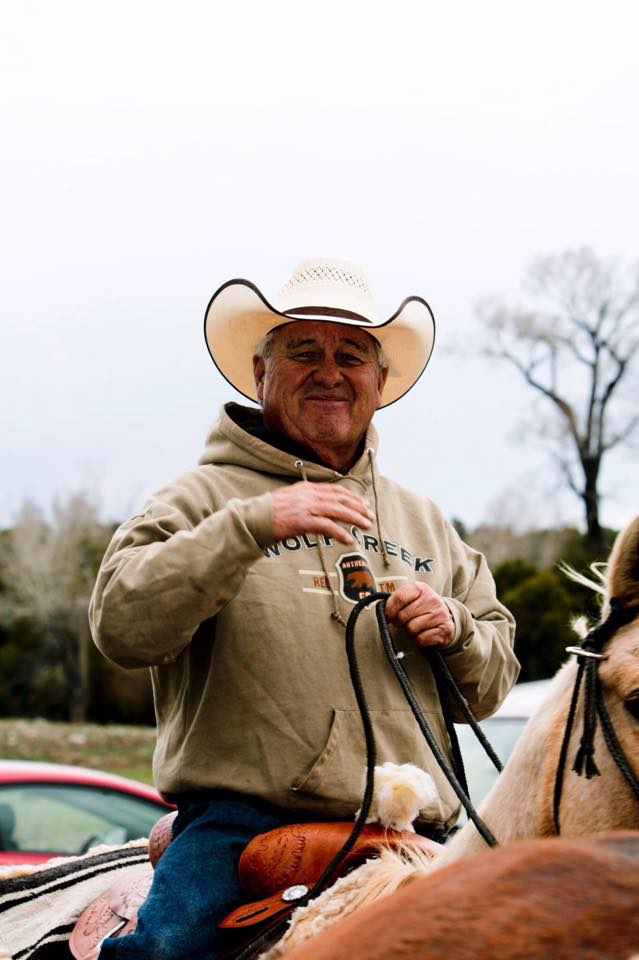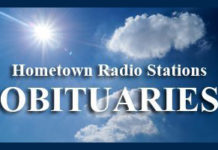Eddie Crain/Courtesy Photo
BY LINDA HULL
Vice President
Rotary Club of Los Alamos
“Helping veterans help themselves. That’s what we do,” began Eddie Crain when describing Healing America’s Heroes to members of the Rotary Club of Los Alamos on September 7th. The non-profit, which Crain founded in 2014, has received financial support and many volunteer hours of Rotary service since 2015 when late Los Alamos Rotarian Jim Nesmith was first introduced to the organization’s work. Crain was joined at the Rotary meeting by HAH members James Barber, mental health counselor; Kitty Gandee, vice president; Dan Gandee, fly-tying expert; and Dennis Carter, treasurer.
Crain was inspired to assist veterans in response to the “large number of suicides, 22 per day, of military members returning from combat.” The HAH mission is described as using “recreational horse and fly-fishing therapies to help treat combat veterans and active-duty service members who suffer from post-traumatic stress disorder (PTSD), military sexual trauma, and traumatic brain injury.”
Until recently, HAH was located in Chama, but will move its operation to former correctional facilities in Fort Stanton, Lincoln County, in October. Contractors will begin work soon on converting the buildings to accommodate up to 50 veterans, men and women, “with dormitories, classrooms, an administrative building, dining hall and commercial kitchen, a workshop, horse corral and barn, and acres of grazing land” for HAH’s nine therapy horses. When renovated, the site will be ideal for HAH’s expanding veterans’ programs.
Eleven new jobs will be created at the new HAH facility. Crain and Barber also hope to incorporate psychology practicums into the program for students from nearby Eastern New Mexico University.
Crain added that “the move to Fort Stanton has gained significant visibility and enthusiastic support” from New Mexico’s political leaders and Congressional delegation in Washington, D.C., the media, and from nearby communities, including Ruidoso and Capitan.
“HAH has successfully hosted 32 male veterans and 36 female veterans through our five-day sessions,” Crain said. “They are recruited through the HAH website, from the Veterans Administration, and by word of mouth. There is never a charge for veterans.” Each veteran is mentored by at least two instructors, many of whom are veterans and share a meaningful connection with the participating veterans, most of whom saw combat in Lebanon, Iraq, and Afghanistan. Clearly one week is not long enough for fully transformative healing, but veterans are welcome to return, and often do as they begin to build confidence in themselves working interactively with horses or finding calm in the peaceful outdoor environment of fly-fishing.
To address the isolation of COVID-19, which has triggered a 20% increase in suicides among military members since March 2020, HAH has been awarded an FY2022 Quality of Life grant by the New Mexico Governor’s Commission on Disability for its COVID Recovery Project. This project will serve 16 disabled veterans, 8 men and 8 women, in two three-day sessions by May 2022. The impact is expected to “improve family and social relationships, emotional health, levels of independence and life skills, and physical well-being” for those veterans who enroll.
In addition to the Quality of Life grant, HAH has been recognized for its “innovative approach and instructional method” with the 2021 Behavioral Health Star awarded by Path to Wellness New Mexico, a multi-agency organization addressing mental health; in 2019, HAH received the Director’s Choice Award from the Los Alamos Community Assets Program. In fact, Cracker, a beloved therapy horse, was the first horse recognized by the New Mexico Behavioral Health Planning Council with the 2021 John Henry Support Animal Award. Cracker was nominated by the veteran who found healing, restored confidence, and increased mobility during his sessions with Cracker.
In the future, HAH plans to expand its connections with veterans and service organizations across New Mexico and into Texas, to include law enforcement officers, firefighters, and first responders among their circle of care. HAH also will actively seek support from financial institutions, hospitality services, and maintenance companies. Although HAH anticipates some funding from state and federal sources, those are often uncertain. As an all-volunteer organization, HAH depends upon individuals’ donations of time and money, especially now as they purchase furniture, equipment, and supplies for the new facility in Fort Stanton.
If you would like to learn more about Healing America’s Heroes, its services for veterans, and ways to donate, please go to https://healing-americasheroes.org/.
Crain, founder of Healing America’s Heroes and a combat veteran of the Vietnam War, grew up in Ruidoso, New Mexico. He serves as the lead instructor of recreational equine therapy at Healing America’s Heroes.
Crain has worked in many capacities with horses since acquiring his own horse when he was seven years old. He has been a ranch manager and has trained quarter horses and thoroughbreds for racing. For several years, Crain was a sales manager with Pat Parelli of the Parelli Natural Horsemanship Program, which helps riders understand horse behavior and how to improve it with love, language, and leadership. Crain has also been a ski instructor and a hunting guide.
Healing America’s Heroes is Crain’s way of helping veterans heal from the trauma of combat duty. He has designed, led, and conducted the Healing America’s Heroes program since 2014. This successful program has helped numerous men and women veterans and is the recipient of many awards from various organizations for its contribution to the well-being of veterans in local communities.
The Rotary Club of Los Alamos meets in person Tuesdays, 12:00-1:00, in the Community Room, Cottonwood on the Greens, at the golf course. A Zoom option is available by contacting Linda Hull, Rotary Club vice-president, 505-662-7950. Hull is also happy to provide information about the Club and its humanitarian service.
Credit: Source link































